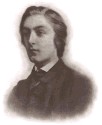






| 
|
As of November 18, 2000, Lane’s World is being superseded by ELCore.Net.
![]()
![]()
At the moment it is fashionable to admire in poetry, knuckles, bits of bones and of dead brains, and to detest that genius for the medium which has given mastery, splendor, light and life to the masterpieces of our language. But why should we trouble ourselves about such falsities?
Dame Edith Sitwell, Atlantic Book of British and American Poetry (1958) page 714
(The Oxford Book of English Verse, selected and edited by Sir Arthur Quiller-Couch, was originally published in 1900; it is the classic anthology of poetry in English [to be distinguished from both The New Oxford Book of English Verse, by Helen Gardner, 1972, and The Oxford Book of English Verse, Christopher Ricks, 1999.] Fremlin’s websites at Altern and Cibercities have one index [numerical, effectively chronological author], a cool Javascript “random poem generator”, and use light text on a dark background. Project Gutenberg text file is a 1.14 megabyte file, the acknowledged source of Fremlin’s texts; the zip file is 453.6 kilobytes. Bibliomania has two indexes [chronological author, first line], previous and next author navigation, uses dark text on a light background, and has banner advertisements. Bibliomania — whose server seems not to be quite dependable — has the text of the “new” revised and enlarged edition [1939], in which there are more and different poems [967 vs. 883]; the numbering scheme is, therefore, different from that of the other versions, which use the original edition. And Bibliomania has one webpage per poet rather than per poem, as the other sites have).
Not, perhaps, since Dryden and Pope have we had such mountains and gulfs, such raging waves, such deserts of the eternal cold, and these are produced not by a succession of images alone, but by the movement of the lines, the texture, and by Hopkins’ supreme gift of rhetoric.
Dame Edith Sitwell, Atlantic Book of British and American Poetry (1958) page 758
Not long ago a distinguished critic, reviewing Father Tabb’s poetry, remarked, "At his most obvious affinity, Emily Dickinson, I can only glance. It seems to me that he contains in far finer form pretty much everything that is valuable in her thought." Are we thus to lose the fine significance of poetic individuality? A poet is unique, incomparable, and to make these comparisons between poets is to ignore the primary laws of criticism, which seeks to discover the essential individuality of writers, not their chance resemblances. It is as futile as it is unjust to parallel Father Tabb’s work with Emily Dickinson’s: his is full of quiet reverie, hers has a sharp stabbing quality which disturbs and overthrows the spiritual ease of the reader.
Martha Hale Shackford, “The Poetry of Emily Dickinson” (January 1913)
![]()
![]()
As of November 18, 2000, Lane’s World is being superseded by ELCore.Net.